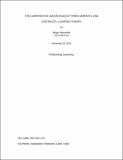The Comparative Advantages of Firms, Markets and Contracts: a Unified Theory
Author(s)
Wernerfelt, Birger
DownloadWernerfelt_The comparative.pdf (406.0Kb)
OPEN_ACCESS_POLICY
Open Access Policy
Creative Commons Attribution-Noncommercial-Share Alike
Terms of use
Metadata
Show full item recordAbstract
The most efficient labour market mechanism depends on the advantages of specialization, workers’ costs of switching between entrepreneurs, and the frequency with which needs change. Multilateral mechanisms are more efficient when specialization is more advantageous, when it is cheap for workers to switch between entrepreneurs, and when individual entrepreneurs cannot occupy a worker on a full-time basis. Given a bilateral mechanism, employment (a firm) is more efficient than contracts when in-process adjustments arise more frequently. There exist three regions in which firms, markets and sequences of bilateral contracts are weakly more efficient than all other mechanisms in a big class.
Date issued
2014-10Department
Sloan School of ManagementJournal
Economica
Publisher
Wiley Blackwell
Citation
Wernerfelt, Birger. “The Comparative Advantages of Firms, Markets and Contracts: a Unified Theory.” Economica 82, no. 326 (October 16, 2014): 350–367.
Version: Original manuscript
ISSN
00130427
1468-0335